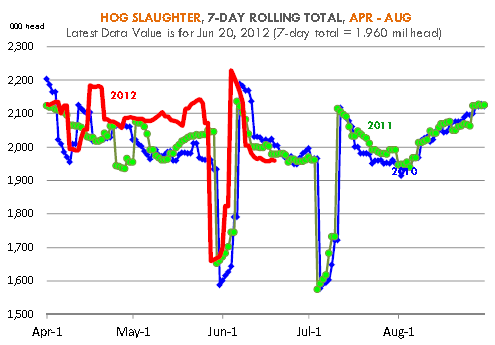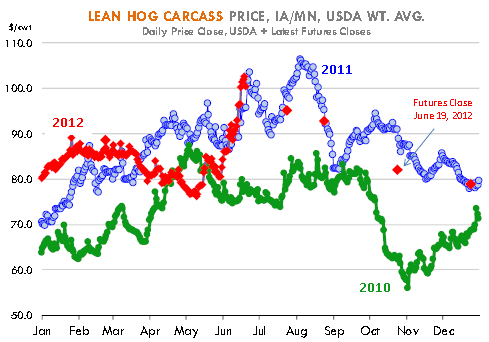



CME: Lean Hog Futures Rally on Smaller Slaughter Numbers
US - Lean hog futures have rallied in the last 30 days on smaller slaughter numbers, lower hog weights and improvements in short term demand, write Steve Meyer and Len Steiner.Below are some of our observations:
Slaughter: We run a daily rolling average of the slaughter for the
past seven days, basically an indication of weekly slaughter at any
point in time. As the top chart shows, hog slaughter for much of
may was running higher than both last year and 2010. During the
period 5 May - 25 May, hog slaughter was running as much as 5 per cent
higher than a year ago. This was about 2 percentage points higher
than what the 1 March inventory survey indicated. One has to
see the slaughter during this period in the cotext of hog and pork
prices during April. The collapse in cattle futures and the effects
of LFTB caused end users to pull back and reduce purchases. Producers
felt compelled to accelerate marketings even though this
meant some short term pain, evidenced in hog prices at $76 on
10 May. The acceleration in marketings did have the effect of
making producers more current. Post memorial day slaughter has
dipped below 2 million head per week, about 1 per cent lower than a year
ago.

Weights: In addition to seeing fewer hogs come to market so far
in June, market also has had to contend with the seasonal decline
in hog carcass weights. At this point, hog weights have followed a
very similar pattern to last year. If anything, this year the difference
from peak to trough will be even bigger than it was a year
ago. Consider that in early April, hog weights were establishing
all time record highs, with carcass weights over $210.lb. By early
May, weights continued to persist at 208-209 pounds per carcass,
about 1 per cent higher than a year ago. The latest data from the mandatory
price reporting system last pegged hog weights at 203.6
pounds. The seven day rolling average now stands at 204.5
pounds per carcass. Hog weights are still running about 0.6 per cent
higher than a year ago but the 4 pound seasonal reduction combined
with the lower slaughter numbers effectively has removed
about 37 million pounds of pork (-8.5 per cent) since mid May (slaughter
from 2.1 million to 1.96 million, weights from 209 lbs to 205 lbs).
Demand: Clearly it is difficult to make good short run demand
estimates given the limited information available. However, there
is some evidence to suggest that retailers were able/willing to boo
pork for post-Memoridal day needs. Bellies in the 85 cent range
and 72CL trimmings (sausage materials) as low as 55 cents clearly
presented an opportunity. The problem is that that there is a lag effect in demand. You don't see those May buys until June rolls
around. What appears to have happened is that end users looking
to buy spot loads are finding out much of the product is already
spoken for. The reduction in supply has further exacerbated
the situation, limiting spot purchases. End users that
held off on forward buys and wanted to stay on the market are
now have to fish in a much smaller pond. Last year, the post
Memorial Day rally ended in mid-June. Futures are now trying
to guess if were are ready for a repeat performance.









